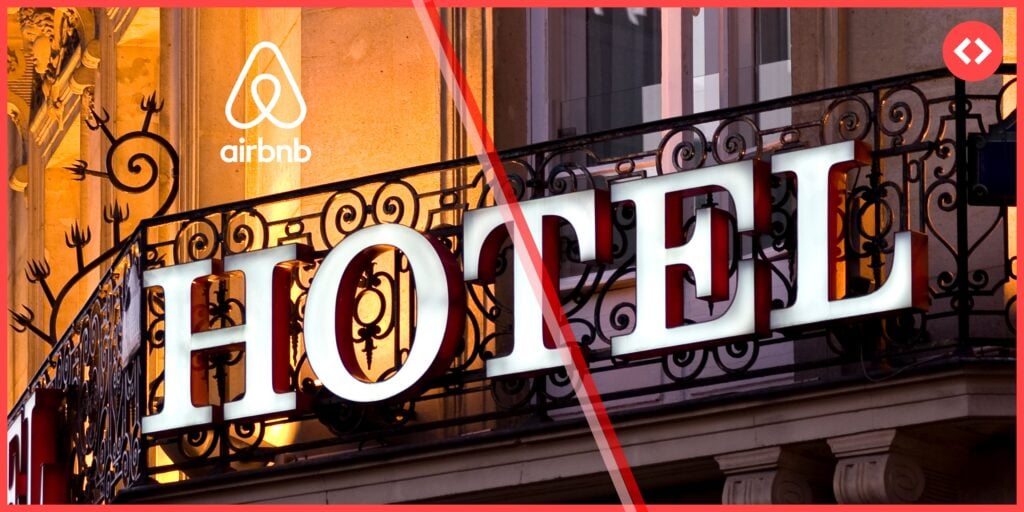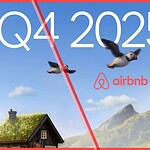During its Q2 2025 earnings call, Airbnb announced it expects moderate growth in Q3 and especially Q4. Alongside the cautious outlook, CEO Brian Chesky made a point of saying Airbnb will be “going significantly more aggressively into hotels.”
This move puts Airbnb directly up against archrival Booking.com, a platform that not only dominates online hotel distribution in Europe but also offers millions of short-term rentals. While Airbnb built its brand on disrupting the hotel industry, Booking.com has long mastered the mix of hotels and alternative accommodations — and now Airbnb is signaling it wants to compete on both fronts.
The timing suggests two things:
- Signaling to investors: Airbnb wants to show it’s pursuing a higher-growth, lower-barrier opportunity — hotels — alongside its more experimental bets like Services and Experiences.
- Reassuring analysts: There’s already global demand from travelers who need a place to sleep. Compared to scaling Experiences or Services, onboarding hotels is a faster, more familiar growth lever.
Hotels as a “low-hanging fruit” growth bet
Analysts have been questioning Airbnb about the time, cost, and scalability of Experiences and Services. These initiatives are still small in revenue and require building both supply and demand from scratch.
Hotels are different:
- Existing demand: Airbnb already has millions of travelers searching for accommodation every day.
- Proven model: The HotelTonight acquisition gives Airbnb a curated, mobile-first hotel channel and a loyalty tie-in.
- Supply gap filler: In peak seasons or top markets, homes aren’t always available — hotels can plug those gaps quickly.
- Potential cost advantage: Airbnb says it can offer independent hotels and B&Bs a “very competitive” take rate compared to Booking.com’s 15–17%. That lower distribution cost could, in theory, be passed on to travelers in the form of better prices.
Not Hilton or Marriott — Think Boutique, Independent, and Licensed
When Chesky talks about going “significantly more aggressively into hotels,” don’t picture Airbnb suddenly chasing the same corporate chains it once positioned itself against.
In Airbnb’s playbook, “hotels” is often shorthand for independent licensed accommodations — the very properties that make up a large share of Booking.com’s alternative accommodation category.
That means:
- Boutique hotels with 10–50 rooms.
- Family-run inns that blur the line between hotel and B&B.
- Large, licensed bed-and-breakfasts that operate almost like mini-hotels.
These businesses share key traits: they’re owner-operated, deeply local, and often heavily dependent on Booking.com for online bookings. For Airbnb, they represent both:
- Brand fit — local, host-led, experiential stays align with Airbnb’s original ethos.
- Regulatory advantage — licensed B&Bs and hotels often sidestep STR caps in major cities, allowing Airbnb to retain supply in restricted markets.
(For a deeper dive into why licensed B&Bs could be Airbnb’s untapped growth segment, see our related briefing: “Forget Airbnb’s flashy services expansion — it’s time to put the B&B back in Airbnb.”)
Brand visibility and positioning risks
While the economics are appealing, analysts will note two challenges Airbnb must address if this strategy is to scale:
- Visibility on platform
- Today, the default “Stays” category is labeled Homes. Hotels and B&Bs are not front-and-center, and even when browsing, they may appear under less intuitive labels like “Guesthouses” or “Boutique hotels.”
- Without prominent placement, hotels risk being a hidden category, reducing their impact on conversion and guest awareness.
- Messaging contradictions
- Airbnb’s recent ad campaigns have leaned into the narrative that hotels are a losing proposition — cramped, impersonal, and less comfortable than vacation rentals.
- To make hotels and B&Bs visible without undermining that messaging, Airbnb will need a clear sub-branding or category strategy, or risk confusing guests who’ve been told for years that “Airbnb > hotels.”
The U.S. loyalty challenge
In the U.S., the dynamic is different. Many hotel users are loyal to big chains and their rewards programs, making it harder to win them over. Booking.com faces this too, and it’s one reason its U.S. hotel market share lags Europe.
Chesky acknowledged Airbnb is at a “competitive disadvantage” without a loyalty program but hinted at something “more interesting and novel” than a traditional points system. This could be:
- A way to convert hotel bookers into home-rental guests.
- A differentiator from both Booking.com’s Genius program and hotel chains’ status tiers.
The HotelTonight–Airbnb credit integration (10% Airbnb credit for HotelTonight bookings) might be the first building block of that loyalty strategy.
Why this matters for hosts and managers
For vacation rental managers, Airbnb’s hotel expansion could mean:
- More cross-traffic — if hotel listings bring more travelers to Airbnb, home listings might benefit from increased exposure.
- Search competition — hotels could compete directly with STRs in certain markets and dates.
- Pricing pressure — especially in peak seasons if hotels discount to fill rooms last minute.
For independent hotels & B&Bs, this is an opportunity to:
- Join a platform with a huge U.S. traveler base.
- Pay potentially lower commissions than Booking.com.
- Access travelers who might otherwise never see your property.
Thibault Masson is a leading expert in vacation rental revenue management and dynamic pricing strategies. As Head of Product Marketing at PriceLabs and founder of Rental Scale-Up, Thibault empowers hosts and property managers with actionable insights and data-driven solutions. With over a decade managing luxury rentals in Bali and St. Barths, he is a sought-after industry speaker and prolific content creator, making complex topics simple for global audiences.








